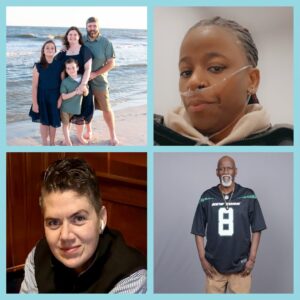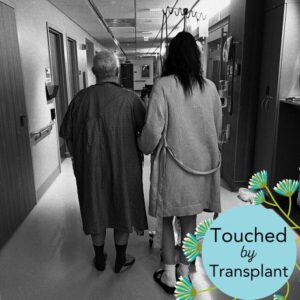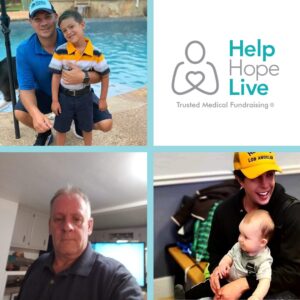In October 2013, Douglas Petrie complained to his doctor about shortness of breath. A lung specialist diagnosed him with idiopathic pulmonary fibrosis (IPF). By September of the following year, a lung infection had propelled Doug onto the lung transplant waiting list. This is Doug’s transplant story, as told by his wife and caregiver Carol Petrie.
Doug got his transplant August 16, 2015. As I drove home at 2 a.m. after the operation and seeing Doug in the ICU, I thought, “Doug has been born again. He has a new life. He can breathe.” This is the first time I have written about our adventure.

Doug, left, was “born again” after transplant, says wife Carol
I have likened our transplant experience to a pregnancy. We were on call, with a bag packed, and Doug was on the list for nine months. Wherever we went, we had to travel with Doug’s supplies just in case.
When Doug was first diagnosed, he was told, “Don’t worry–you have the slow-moving kind of IPF.” What we didn’t know was that even a cold could cause his health to deteriorate quickly. We had to learn that everything was a “big deal.” Even though I had done a little research on the Internet, I did not know which questions to ask. We are very grateful for the medical professionals who helped us because we were out of our depth.
We could see Doug’s health go downhill. We kept liquid oxygen in the house for him to use. When he had a doctor’s appointment, we always had to make sure we packed enough oxygen. Going anywhere became a production. We learned to adapt and manage Doug’s time so we wouldn’t miss any big occasions.

Carol “could see Doug’s health go downhill” pre-transplant
Doug got a bill from the hospital for $572,000 about four months after the transplant. I was told the whole package would be about $1 million. There are constant doctor visits to pay for. While Doug took two medications prior to his IPF diagnosis, after transplant and for the rest of his life, he’ll be taking over 15 pills per day. He can’t even skip one day; these pills keep him alive.
Doug’s insurance helps to reimburse us for mileage, tolls, some meals and some lodging up to a year after transplant. We have not been able to qualify for help from Medicaid like some organ transplants do.
HelpHOPELive has been a big help to us. The bills from the pharmacy go straight to HelpHOPELive for payment so we don’t have to cover the cost up front. The staff at HelpHOPELive is helpful and knowledgeable and has advised me on which fundraising ideas work better than others.

Carol added Doug’s HelpHOPELive page to her email signature to reach new contributors
A doctor friend of ours sent out letters to his colleagues informing them of Doug’s condition and asking for donations, and they raised more money than any one big fundraiser would have. I’m working on an idea for a large annual event that would pay for Doug’s medicines for a year.
Doug says he had to learn to breathe again after the transplant. With a few precautions, he should be able to do almost anything. It’s been a year since his lung transplant and we are forever grateful to the donor and family, and to all of the folks at Tampa General Hospital and HelpHOPELive.

Doug “should be able to do almost anything” post-transplant
This has been my third time serving as a caregiver. I took care of my parents before they died. I have never been interested in medicine or taking care of the ill, so taking care of someone this time around is surreal. This is not my calling, but it is what I do for a loved one.
There are decisions I had to make for the family when I first took on this role. I had to tell Doug he had to stop driving until after the transplant. I had to make sure I had all the contact numbers for doctors and the hospital. It was my job to tell the doctors how Doug was progressing. I had to make sure Doug did not do too much. It was frustrating for him when he would become tired and he would not be able to do little things like carry dishes from the table to the kitchen. I had to learn [to identify] when he reached this level and help him calm down.
You need others to help when you are a caregiver. Our son, Chase, and a young family friend helped out. It is good to have someone on call who can drive for you. After transplant, Doug had to see the doctor once a week for 8 weeks. The doctor was an hour away and the drive became tiresome for us.

“You need others to help when you are a caregiver.”
Since the transplant, I’m more of a manager and I’m less hands-on. Doug takes his own vital statistics daily, checks his lung capacity and logs the information to take to monthly clinic visits. I just make sure it gets done.
We have tried through this journey to keep our sense of humor and that has been a big help. We have also had a strong prayer support system. I have tried to carve out time for myself away from the house, whether it’s a movie, lunch with a friend or a haircut.
Doug and I have a deep faith and that has kept us grounded. I look at Isaiah 43:1-3, a passage that includes two of my favorite words from scripture: “fear not.” I claimed this scripture for our family and have gone back to it time after time, praying it back to God.
Our neighbors and friends have helped with contributions and checking in on me and our son. I have a group email list for family, friends and contributors and I have a group text for family to keep everyone up to date. Between that, posting on Facebook and calling our church, I can have several hundred people praying for Doug in a very short period of time. This has been a source of hope and assurance for us.
I would advise other transplant families to keep their sense of humor and laugh lots. Doug recommends to other transplant families that they should do everything medical professionals tell them to do, no more and no less.
Don’t try to do more because you’ll tire yourself out. Be sure the doctors order home health support for you including a physical therapist. Don’t be afraid of filling up your pill box. Don’t be afraid of calling your post-transplant coordinator with questions. Don’t be worried about raising money – HelpHOPELive will help you.
Learn more about life after transplant by checking in with Doug and his family at helphopelive.org. Want to learn more about transplant preparations, costs and fundraising options? Find more transplant stories like this one.
In October 2013, Douglas Petrie complained to his doctor about shortness of breath. A lung specialist diagnosed him with idiopathic pulmonary fibrosis (IPF). By September of the following year, a lung infection had propelled Doug onto the lung transplant waiting list. This is Doug’s transplant story, as told by his wife and caregiver Carol Petrie.
Doug got his transplant August 16, 2015. As I drove home at 2 a.m. after the operation and seeing Doug in the ICU, I thought, “Doug has been born again. He has a new life. He can breathe.” This is the first time I have written about our adventure.

I have likened our transplant experience to a pregnancy. We were on call, with a bag packed, and Doug was on the list for nine months. Wherever we went, we had to travel with Doug’s supplies just in case.
When Doug was first diagnosed, he was told, “Don’t worry–you have the slow-moving kind of IPF.” What we didn’t know was that even a cold could cause his health to deteriorate quickly. We had to learn that everything was a “big deal.” Even though I had done a little research on the Internet, I did not know which questions to ask. We are very grateful for the medical professionals who helped us because we were out of our depth.
We could see Doug’s health go downhill. We kept liquid oxygen in the house for him to use. When he had a doctor’s appointment, we always had to make sure we packed enough oxygen. Going anywhere became a production. We learned to adapt and manage Doug’s time so we wouldn’t miss any big occasions.

Doug got a bill from the hospital for $572,000 about four months after the transplant. I was told the whole package would be about $1 million. There are constant doctor visits to pay for. While Doug took two medications prior to his IPF diagnosis, after transplant and for the rest of his life, he’ll be taking over 15 pills per day. He can’t even skip one day; these pills keep him alive.
Doug’s insurance helps to reimburse us for mileage, tolls, some meals and some lodging up to a year after transplant. We have not been able to qualify for help from Medicaid like some organ transplants do.
HelpHOPELive has been a big help to us. The bills from the pharmacy go straight to HelpHOPELive for payment so we don’t have to cover the cost up front. The staff at HelpHOPELive is helpful and knowledgeable and has advised me on which fundraising ideas work better than others.

A doctor friend of ours sent out letters to his colleagues informing them of Doug’s condition and asking for donations, and they raised more money than any one big fundraiser would have. I’m working on an idea for a large annual event that would pay for Doug’s medicines for a year.
Doug says he had to learn to breathe again after the transplant. With a few precautions, he should be able to do almost anything. It’s been a year since his lung transplant and we are forever grateful to the donor and family, and to all of the folks at Tampa General Hospital and HelpHOPELive.

This has been my third time serving as a caregiver. I took care of my parents before they died. I have never been interested in medicine or taking care of the ill, so taking care of someone this time around is surreal. This is not my calling, but it is what I do for a loved one.
There are decisions I had to make for the family when I first took on this role. I had to tell Doug he had to stop driving until after the transplant. I had to make sure I had all the contact numbers for doctors and the hospital. It was my job to tell the doctors how Doug was progressing. I had to make sure Doug did not do too much. It was frustrating for him when he would become tired and he would not be able to do little things like carry dishes from the table to the kitchen. I had to learn [to identify] when he reached this level and help him calm down.
You need others to help when you are a caregiver. Our son, Chase, and a young family friend helped out. It is good to have someone on call who can drive for you. After transplant, Doug had to see the doctor once a week for 8 weeks. The doctor was an hour away and the drive became tiresome for us.

Since the transplant, I’m more of a manager and I’m less hands-on. Doug takes his own vital statistics daily, checks his lung capacity and logs the information to take to monthly clinic visits. I just make sure it gets done.
We have tried through this journey to keep our sense of humor and that has been a big help. We have also had a strong prayer support system. I have tried to carve out time for myself away from the house, whether it’s a movie, lunch with a friend or a haircut.
Doug and I have a deep faith and that has kept us grounded. I look at Isaiah 43:1-3, a passage that includes two of my favorite words from scripture: “fear not.” I claimed this scripture for our family and have gone back to it time after time, praying it back to God.
Our neighbors and friends have helped with contributions and checking in on me and our son. I have a group email list for family, friends and contributors and I have a group text for family to keep everyone up to date. Between that, posting on Facebook and calling our church, I can have several hundred people praying for Doug in a very short period of time. This has been a source of hope and assurance for us.
I would advise other transplant families to keep their sense of humor and laugh lots. Doug recommends to other transplant families that they should do everything medical professionals tell them to do, no more and no less.
Don’t try to do more because you’ll tire yourself out. Be sure the doctors order home health support for you including a physical therapist. Don’t be afraid of filling up your pill box. Don’t be afraid of calling your post-transplant coordinator with questions. Don’t be worried about raising money – HelpHOPELive will help you.
Learn more about life after transplant by checking in with Doug and his family at helphopelive.org. Want to learn more about transplant preparations, costs and fundraising options? Find more transplant stories like this one.











